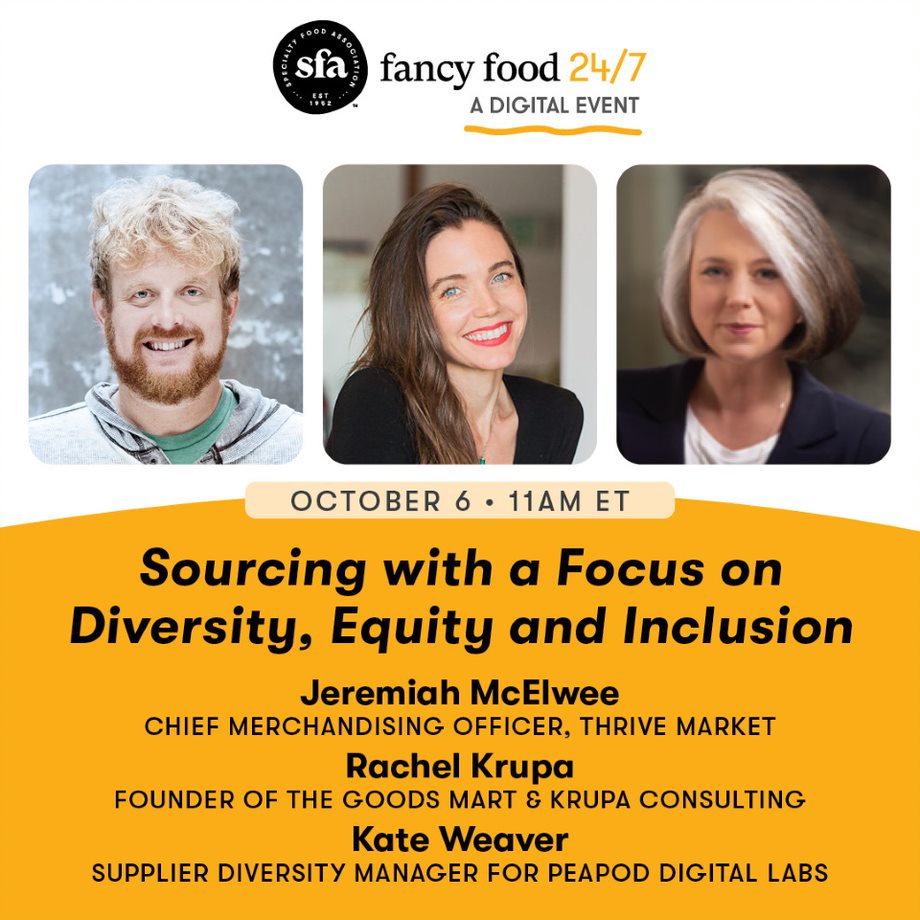The current social environment and retail market conditions have created opportunities for minority and women-owned specialty food suppliers to gain retail penetration, according to presenters at a Fancy Food 24/7 panel on Wednesday.
“Conscious consumerism is at an all-time high,” said Kate Weaver, supplier diversity manager at Peapod Digital Labs, an ecommerce division of Ahold Delhaize USA. “People are really seeking transparency about the products and services that they buy.”
She cited data collected for Ahold’s Retail Business Services division by research firm Hootology that found that 57 percent of household decision makers said that identifying products from diverse-owned companies influenced their decisions to shop at that retailer. In addition, members of BIPOC communities are 31 percent more likely than non-BIPOC consumers to shop at a retailer because they have products from diverse-owned companies, and people who shop for groceries online are 82 percent more likely than those who do not shop for groceries online to shop at a retailer because they identify products from diverse-owned companies.
Diverse-owned suppliers should be telling their stories to both retail buyers and consumers, loudly and clearly, Weaver and other panelists said, and they should take the time to have their companies certified as being owned by members of a disadvantaged group.
Ahold Delhaize’s Landover, Maryland-based Giant Food banner last year took the extra step of deploying shelf tags that highlighted diverse-owned products in the store, Weaver noted, and sister chain Stop & Shop frequently showcases diverse-owned suppliers in its printed sales flyers. All of the company’s banners, which also include Food Lion, Hannaford, and The Giant Company, also use social media to reinforce the messages of their diverse-owned suppliers, she said.
Weaver noted that as some large CPG companies have struggled with supply chain issues during the pandemic, it has created opportunities for small producers, including diverse-owned companies, to gain or increase their shelf presence at Ahold Delhaize banners.
The company also has an incubator program for diverse-owned suppliers that provides mentorship and helps these companies grow their retail sales. The program currently includes 11 suppliers, including SFA member Epicurean Food and Beverages.
Jeremiah McElwee, chief merchandising officer at mission-driver ecommerce retailer Thrive Market, agreed that diverse-owned suppliers can benefit by telling the story of their company’s ownership and by becoming certified.
“That is really resonating with our customers — this idea that you can really make a difference with your dollars,” he said. “If you're not telling that story, there is a good chance you are going to get lost in the shuffle.”
At Thrive, customers can include diverse ownership as part of their search criteria when shopping online, along with attributes such as dietary preferences.
The company also seeks to help diverse-owned suppliers scale their businesses by working closely with them on everything from ingredient sourcing to packaging and marketing. That relationship with suppliers has evolved to become “much more dynamic and consultative over time,” McElwee said.
He noted that it’s important for retailers to have open communications with their diverse-owned suppliers to ensure that retailers are meeting their suppliers’ needs. Thrive improved its diverse-owned supplier relationships when it re-evaluated its approach a little over a year ago, he said.
“We had actually considered ourselves to be doing the work already, but when we talked to diverse founders, they told us, ‘That’s not really how we feel,” said McElwee. “Listening to how you can be better and how you can create more access, and how you can be there for those communities is really key.”
Rachel Krupa, founder of boutique public relations firm Krupa Consulting and of The Goods Mart, a retail outlet in New York offering a tightly curated assortment, has also been striving to enhance its sourcing of diverse-owned products.
A little more than half—51 percent—of the brands in The Goods Mart are female founded, and about 30 percent are BIPOC owned, she said. The company is also striving to reach its goal of sourcing 15 percent of its products from Black-owned businesses as part of the 15 Percent Pledge, a national movement to support Black-owned businesses.
“The 15 Percent Pledge is something that I would challenge everyone to take,” said Krupa. “It makes you do your homework and do your research.”
The Goods Mart is also expanding its subscription gift box program for the upcoming holidays to include collections of products founded by women and minorities, she said.
The company also supports small makers with a program called The Good Vibes, a series of biweekly video calls with outside experts that seeks to provide consulting and support in various areas of suppliers’ businesses. It also recently launched “Taste and Tell,” through which consumers can sample a product for free by taking a short survey, accessed via a QR code.
Related: Southeastern Grocers Focuses on Supplier Diversity; Target Makes Progress on Diversity Goals.

